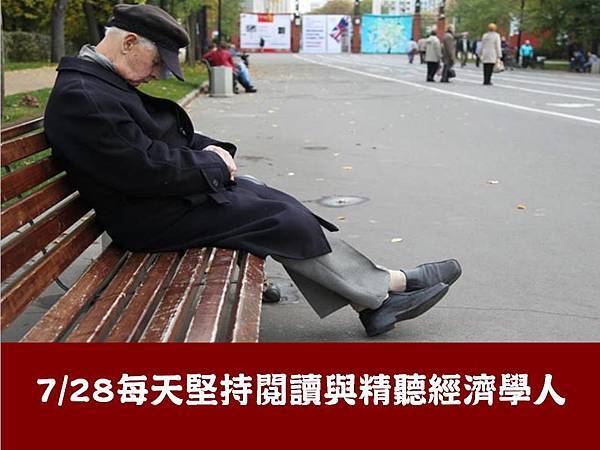
 今日主題:Russian pensions-- An unaffordable system / 俄羅斯養老金--支付不起的制度
今日主題:Russian pensions-- An unaffordable system / 俄羅斯養老金--支付不起的制度
 康康精選GRE&GMAT會考的主題,堅持每天精讀一定會進步的哦!!
康康精選GRE&GMAT會考的主題,堅持每天精讀一定會進步的哦!!
 MP3音檔 (按右鍵可下載聽):喜歡的同學,幫忙推或按讚哦~~
MP3音檔 (按右鍵可下載聽):喜歡的同學,幫忙推或按讚哦~~
http://xia2.kekenet.com/Sou…/2016/…/eco160727_0520516GKV.mp3
 只有音檔怎夠,聽不懂地方,不用怕,康康幫你準備好中英文稿了:
只有音檔怎夠,聽不懂地方,不用怕,康康幫你準備好中英文稿了:
 中英文稿:
中英文稿:
Russian pensions-- An unaffordable system
俄羅斯養老金--支付不起的制度
Russia’s prime minister signs a disastrous pension reform
俄羅斯總理簽署了一項災難性的養老金改革計畫
Vladimir Putin is facing a dilemma: how can Russia’s president fulfil his campaign promises to increase social spending, especially when they were directed toward his political base, while also ensuring that the country’s deficit does not become unsustainable? He is keen to prolong the past decade’s economic stability, which was his biggest electoral asset.
弗拉基米爾•普京面臨著困境:作為俄羅斯總統,他怎麼才能在實現競選中做出的增加社會支出的承諾的同時,特別是這些承諾都是維護為了他的政治基礎做出的,但是同時又要保證俄羅斯的赤字不會變得不可承受。普京熱衷於延續過去十年經濟穩定的狀態,這是他競選中的最大優勢。
If the direction of the country’s pension system is any indication, Mr Putin and his advisers are choosing short-term social and political stability at the expense of long-term growth and investment. On October 1st Dmitry Medvedev, the prime minister and former president, signed a long-expected strategy for reforming the pension system that would, among other things, nearly eliminate the funded component, in which workers pay into a personal investment account they claim upon retirement. The money freed up from this plan is supposed to plug the $50 billion hole in the pay-as-you-go system.
如果俄羅斯養老金體系的方向有所暗示的話,普京和他的顧問都是選擇短期的社會政治穩定,犧牲長期的發展和投資。10月1日,現任總理,即前任總統德米特裡•梅德韋傑夫(Dmitry Medvedev)簽署了人們期盼已久的一項策略,改革養老金制度。工人向個人投資帳戶中存錢,在退休之後便可以擁有這一帳戶的所有權。但是在新的養老金制度下,除了其他方面以外,這種資金成分幾乎被完全取消。這項計畫的騰出來的錢應該能夠堵上現收現付制度造成的100億美元的缺口。
The strategy signed by Mr Medvedev calls for the funded component to decrease from 6% to 2% of the overall pension system. (The plan is still preliminary.) At the moment, those funds are just 1.8 trillion roubles ($5.8 billion), but they act as a catalyst for domestic investment and support a growing industry of fund managers. The funded pillar could also go a long way towards filling the gap in the Russian market for long-term financing, which is necessary for infrastructure development. With those funds gone, any notion of turning Moscow into a global financial centre—a favourite talking point of Mr Medvedev’s presidency—would probably be finished.
梅德韋傑夫簽署的這項策略要求資金成分占整個養老金體系的比重從6%下降到2%。(這仍是初步計畫。)目前,這些資金大約只有1.8萬億盧布(58億美元),但是能夠刺激國內投資,支援資金管理者行業的發展。資金支柱也可以經過長期發展,填補俄羅斯市場長期資金籌措的空白,著對於基礎設施發展來說十分必要。梅德韋傑夫任總統期間,最喜歡說的就是把莫斯科變成國際金融中心。但如果沒有這些資金的話,任何這種想法都可以停止了。
Virtually all Russia’s best economists, as well as the technocrats inside the finance ministry, have warned against cutting the funded pillar. Alexei Kudrin, a former finance minister, has waged a campaign in the pages of Vedomosti, a newspaper, against the idea. Vladimir Nazarov of the Gaidar Institute calls it a “real disaster” that will only finance the pension fund’s current deficit for six years, after which the deficit will begin to grow again—and this time without the money in the funded portion as a stopgap.
幾乎俄羅斯最好的經濟學家以及財政部的技術官僚都提出警告,反對減少資金支柱。前財政部長阿列克謝•庫德林在俄羅斯商業日報上發起一場運動反對這種想法。蓋達爾研究所的弗拉基米爾.納紮羅夫將它稱為一場“真正的災難”,只會為如今的養老基金赤字提供六年的資金,六年之後,赤字將會再次開始增長,這次就沒有資助部分的資金來臨時替補了。
The only way forward, argue nearly all experts, is to raise Russia’s low pension age of 55 for women and 60 for men. Both the IMF and the members of Strategy 2020, an expert group formed by the Russian government, call for a gradual increase of the pension age to 63.
幾乎所有的專家都說未來唯一的方法就是提高如今較低的領取養老金的年齡。女性55歲就可以領取養老金,男性則為60歲。國際貨幣基金組織和由俄羅斯政府組成的專家組“2020戰略”的成員都要求逐漸將退休年齡提高到63歲。
The move is thought to be politically dangerous, if not impossible. Mr Putin has increasingly relied on the support of the rural population and industrial workers, as well as the 40% or so of the electorate who are elderly. One of Mr Putin’s many pre-election promises, now turned into official directives, was to keep the pension age intact. That order left the government with few options.
人們認為,這一舉動在政治上是危險的,也許也是不可能的。普京越來越依賴於農村人口,工業工人,以及大約40%的老年選民的支持。普京在選舉之前做出的一個承諾就是保持退休年齡不變,如今這已經變成了官方指令。這一命令讓政府沒有什麼選擇。
Mr Medvedev and his team were thus handed an unenviable task. No one disputes that today’s pension system, created in 2002, needs some kind of reform. Part of the problem is demography. Declining birth rates in the 1980s and 1990s have left Russia with too few workers to support those in retirement; birth rates have stabilised in recent years but too late to affect the looming pension crisis. Today there are 100 workers for every 87 pensioners, says Evsey Gurvich of the Economic Expert Group, who led the Strategy 2020 pension task-force; by 2020, that figure will be 100 workers for 100 pensioners.
梅德韋傑夫以及他的團隊就收到了一項棘手的任務。如今的養老金制度始建於2002年,它需要一些改革,這點大家都同意。一部分問題在人口分佈。二十世紀八九十年代生育率下降使得俄羅斯的勞動力極為缺乏,不足以支持那些退休人員。近幾年來生育率保持穩定,但是要想影響即將到來的養老金危機已經為時已晚。2020策略養老金特別小組的領導者,經濟專家小組的Evsey Gurvich說,如今,每100個工人要負擔87個養老金領取者的費用,到2020年,每100個工人將要負擔100個養老金領取者的費用。
Mr Gurvich warns of a creeping “gerontocracy”. He predicts a deepening of “paternalistic thinking”, in which citizens regard the state, and not themselves, as the source of their pensions. Perhaps that’s exactly what the Kremlin has in mind.
Gurvich警告人們小心悄悄出現的“老人政府”。他預測,“家長式思考”會更為嚴重,公民會將國家而不是自己視為養老金的來源。或者這正是俄羅斯政府所想的。


 留言列表
留言列表
